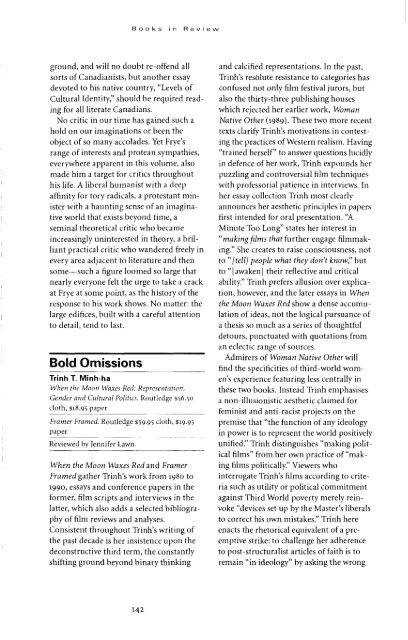The Carpathians - University of British Columbia
The Carpathians - University of British Columbia
The Carpathians - University of British Columbia
Create successful ePaper yourself
Turn your PDF publications into a flip-book with our unique Google optimized e-Paper software.
ground, and will no doubt re-<strong>of</strong>fend all<br />
sorts <strong>of</strong> Canadianists, but another essay<br />
devoted to his native country, "Levels <strong>of</strong><br />
Cultural Identity," should be required reading<br />
for all literate Canadians.<br />
No critic in our time has gained such a<br />
hold on our imaginations or been the<br />
object <strong>of</strong> so many accolades. Yet Frye's<br />
range <strong>of</strong> interests and protean sympathies,<br />
everywhere apparent in this volume, also<br />
made him a target for critics throughout<br />
his life. A liberal humanist with a deep<br />
affinity for tory radicals, a protestant minister<br />
with a haunting sense <strong>of</strong> an imaginative<br />
world that exists beyond time, a<br />
seminal theoretical critic who became<br />
increasingly uninterested in theory, a brilliant<br />
practical critic who wandered freely in<br />
every area adjacent to literature and then<br />
some—such a figure loomed so large that<br />
nearly everyone felt the urge to take a crack<br />
at Frye at some point, as the history <strong>of</strong> the<br />
response to his work shows. No matter: the<br />
large edifices, built with a careful attention<br />
to detail, tend to last.<br />
Bold Omissions<br />
Trinh T. Minh-ha<br />
When the Moon Waxes Red: Representation,<br />
Gender and Cultural Politics. Routledge $56.50<br />
cloth, $18.95 paper<br />
Framer Framed. Routledge $59.95 cloth, $19.95<br />
paper<br />
Reviewed by Jennifer Lawn<br />
When the Moon Waxes Red and Framer<br />
Framed gather Trinh's work from 1980 to<br />
1990, essays and conference papers in the<br />
former, film scripts and interviews in the<br />
latter, which also adds a selected bibliography<br />
<strong>of</strong> film reviews and analyses.<br />
Consistent throughout Trinh's writing <strong>of</strong><br />
the past decade is her insistence upon the<br />
deconstructive third term, the constantly<br />
shifting ground beyond binary thinking<br />
and calcified representations. In the past,<br />
Trinh's resolute resistance to categories has<br />
confused not only film festival jurors, but<br />
also the thirty-three publishing houses<br />
which rejected her earlier work, Woman<br />
Native Other (1989). <strong>The</strong>se two more recent<br />
texts clarify Trinh's motivations in contesting<br />
the practices <strong>of</strong> Western realism. Having<br />
"trained herself" to answer questions lucidly<br />
in defence <strong>of</strong> her work, Trinh expounds her<br />
puzzling and controversial film techniques<br />
with pr<strong>of</strong>essorial patience in interviews. In<br />
her essay collection Trinh most clearly<br />
announces her aesthetic principles in papers<br />
first intended for oral presentation. "A<br />
Minute Too Long" states her interest in<br />
"makingfilms that further engage filmmaking."<br />
She creates to raise consciousness, not<br />
to "[tell] people what they don't know" but<br />
to "[awaken] their reflective and critical<br />
ability." Trinh prefers allusion over explication,<br />
however, and the later essays in When<br />
the Moon Waxes Red show a dense accumulation<br />
<strong>of</strong> ideas, not the logical pursuance <strong>of</strong><br />
a thesis so much as a series <strong>of</strong> thoughtful<br />
detours, punctuated with quotations from<br />
an eclectic range <strong>of</strong> sources.<br />
Admirers <strong>of</strong> Woman Native Other will<br />
find the specificities <strong>of</strong> third-world women's<br />
experience featuring less centrally in<br />
these two books. Instead Trinh emphasises<br />
a non-illusionistic aesthetic claimed for<br />
feminist and anti-racist projects on the<br />
premise that "the function <strong>of</strong> any ideology<br />
in power is to represent the world positively<br />
unified." Trinh distinguishes "making political<br />
films" from her own practice <strong>of</strong> "making<br />
films politically." Viewers who<br />
interrogate Trinh's films according to criteria<br />
such as utility or political commitment<br />
against Third World poverty merely reinvoke<br />
"devices set up by the Master's liberals<br />
to correct his own mistakes." Trinh here<br />
enacts the rhetorical equivalent <strong>of</strong> a preemptive<br />
strike: to challenge her adherence<br />
to post-structuralist articles <strong>of</strong> faith is to<br />
remain "in ideology" by asking the wrong

















